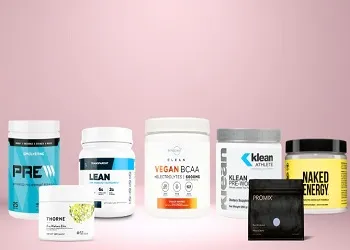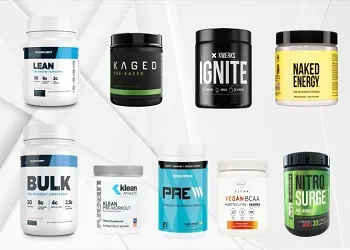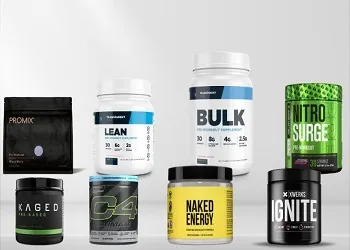Yes, it is possible to be a fitness fanatic without using pre-workout supplements! Their overwhelming popularity is telling, though.
People want to feel alert and energized for their workouts. While this is understandable and important for reaching fitness goals, the humble cup of coffee in place of pre-workout may provide similar benefits.
Though there are clean versions of pre-workout powders, coffee is the most natural choice to enhance wakefulness. For anyone concerned about hidden ingredients or unregulated products, or for someone looking to cut costs, coffee may serve nicely as a pre-workout beverage.
This article will delve into the science, benefits, strategies, and drawbacks of consuming coffee as pre-workout.
Table of Contents
Coffee As Pre-Workout
How Caffeine Works
Caffeine is a natural stimulant, meaning it isn’t manufactured in a lab. Caffeine works by stimulating the central nervous system (CNS) to increase focus, concentration, and reaction time. It’s an adenosine receptor agonist, meaning it blocks adenosine receptors in the brain. Adenosine is what promotes sleep, hence why coffee keeps promoting wakefulness.
Is Caffeine a Good Pre-Workout?
Many people may use coffee as pre-workout for its purported benefits. There is a substantial amount of research regarding caffeine consumption and athletic performance.
Several studies have proven an adequate dose of caffeine can improve athletic performance in the vertical jump, running, and generally aerobic activities.

According to recent research, caffeine supplementation before exercise provides a small but significant improvement compared to placebo. For athletes or those who frequent the gym, small improvements can make a big difference in performance.
Proposed Benefits
Accelerated Fat Loss
Caffeine is proven to increase metabolic rate and fat oxidation when combined with exercise. To reap this benefit, researchers believe a dose of at least 3 mg/kg is needed to see significant fat oxidation, and this effect is more pronounced in untrained adults.
Improved Focus & Concentration
This is undoubtedly a benefit of caffeine. Alertness and focus are highly beneficial for exercise as they improve concentration, establish a strong mind-to-muscle connection, enhance reaction times, and increase overall motivation and effort.
Faster Workout Recovery Times
There have been positive results in the past, but a large study investigating caffeine’s effect on delayed onset muscle soreness (DOMS) after resistance exercise indicated that the data on this is inconclusive.
Reduces Perceived Exertion
Caffeine does appear to reduce perceived exertion from exercise, particularly from aerobic workouts.

How to Use Coffee As a Pre-workout Drink
Timing
You should drink coffee 45 minutes before a workout to experience its peak effects. After 45 minutes, the effects get lower as your body burns the caffeine from coffee. A more general recommendation for using coffee as pre-workout is to consume coffee 30–60 mins before a workout.
Bear in mind, if you prefer to workout after work or in the evening, drinking coffee late in the day may affect sleep quality or cause insomnia (difficulty falling asleep). If your sleep quality is poor, your workout performance and recovery will be poor. Don’t sabotage your fitness goals by not prioritizing healthy sleep habits!
On average, caffeine has a half-life of 5 hours. So, if you drink 200 mg (~1 cup) of caffeine through coffee prior to your 6:00 PM workout, 100 mg of caffeine will still be in your system before 11:00 PM. Some people that are more sensitive to caffeine may still feel its effects after 10–12 hours.
The American Academy of Sleep Medicine (AASM) recommends avoiding caffeine fewer than 6 hours before your anticipated bedtime. However, it’s no secret that caffeine affects everyone differently. You probably know some people that drink a cup of coffee and fall asleep and others that drink three sips and are ready to run a marathon. The important thing is that you’re aware of the potential effects and do what works best for you and your health goals.
Amount
The amount of coffee that may provide you benefits will depend on factors like your body weight, habitual caffeine consumption, age, gender, and more. It will have a lesser effect on those who already drink coffee or caffeinated beverages regularly since a human body can build a tolerance.
The recommended daily dose of caffeine is 200–400 mg (2–4 cups of coffee) for healthy adults. Consult with a health professional if you’re pregnant, breastfeeding, or taking medication, as this level may vary for subgroups of the population.
The International Society of Sports Nutrition’s (ISSN) recommendation is 3–6 mg of caffeine per kilogram of body weight before exercise. However, authors noted that the majority of people will notice benefits at a 3 mg/kg dose.
Exceeding 400 mg in a day can result in unpleasant side effects like feeling anxious or having a rapid heart rate, especially in those who have a lower caffeine tolerance.
Type
The type of coffee you choose to drink as pre-workout will vary in how much caffeine is in it. For example, an instant coffee will provide a gentler and more sustained effect, while a shot of espresso or cold brew could give you a burst of energy. A bit of variety is good for the soul.
According to the AASM, the amount of caffeine varies between types of coffee.
- Brewed coffee: 1 cup (8 oz) = 95 mg of caffeine
- Espresso: 1 shot (1 oz) = 64 mg of caffeine
- Instant coffee = 1 cup (8 oz) = 62 mg of caffeine
The type of coffee you choose to drink before a workout may impact your experience using coffee as a pre-workout. An espresso shot is going to provide a quick and more pronounced energy burst compared to an iced latte. So make your decision based on how your body reacts to coffee and what you need at that moment.

You also need to consider what is in your coffee drink and make sure that these options align with your health goals. If your goal is to improve your health, lose fat, and build lean muscle, it’s best to keep it simple. Drinking sugary or high-calorie coffees beforehand could undermine the hard work you put in at the gym.
Sometimes the healthiest option is also the simplest. In this case, the humble black coffee or an unsweetened cold brew is going to provide the caffeine you desire but without anything extra. If you can’t stand the thought of drinking plain coffee, a bit of dairy or plant-based milk will add a nice creaminess. If you need sweetener, try and limit the amount you put in coffee to 1–2 teaspoons.
Specialty coffees (cappuccino, latte, flat white, etc.) are fine for some people, but they contain a lot of milk. Dairy products before a workout may cause issues for some.
If you have more time, why not make a blended pre-workout coffee shake with a frozen banana, protein powder, and coffee? My pre-exercise coffee drink of choice is an iced cold brew with a bit of oat milk.
There are even mushroom coffees these days that have additional ingredients for focus and cognition, if you’re into that. If you’re all business, downing a shot of espresso will certainly do the trick. The point is, feel free to get creative and find what works best for you.
Side Effects
If you are a coffee drinker, you may be familiar with common side effects of coffee, especially if you overdo it and drink too much at times. Also, some people find drinking coffee on an empty stomach to cause issues, so try pairing coffee with a snack or drinking a full glass of water first if you are sensitive to this.
Common side effects of coffee are:
- Stomach upset and digestive issues
- Jitters
- Anxiousness
- Increased heart rate
- Sleep disturbances
Of course, most people don’t experience any side effects when drinking 1–2 cups of coffee a day. If you’re planning to drink coffee before a workout, these symptoms can be exacerbated with physical activity. Try starting with a smaller amount before workouts and increase how much you drink over a few days or weeks.
Coffee vs. Pre-Workout Supplements

A pre-workout supplement can be a non-negotiable aspect of some gym goers’ workouts. Others may not have heard of pre-workout, feel that the pre-workout boost isn’t necessary, or don’t like using supplements in general. Caffeine is a fairly standard ingredient in most pre-workout formulas due to its proven eugeroic (wakefulness) effects during exercise.
Most of us are familiar with another prime source of caffeine — coffee. Coffee is better regulated, contains safer levels of caffeine, is less expensive, and does not have hidden ingredients. On the flip side, it doesn’t have additional ingredients that may be helpful for exercise performance and recovery.
The key differences to consider between coffee and pre-workout supplements are nutrition, ingredients, effects, and cost.
Nutrition
As a food item, coffee is regulated by the FDA. On the other hand, supplements are somewhere in between a food and a medicine, so it is a bit of a gray area. If there happens to be an unsafe ingredient in a new supplement, this is more likely to slip through the regulatory cracks as opposed to potentially harmful food or drugs.
Effects
Coffee contains less caffeine, so it may be a more manageable amount for some. Some pre-workout formulations contain very high amounts of caffeine that may be too much for some to manage. Exceeding a 200-mg dose of caffeine before a workout may cause a racing heartbeat, nervousness, or jitteriness.
Cost
Coffee is typically more cost-effective than pre-workout supplements. It varies greatly, but supplements are not necessarily cheap. Coffee prices will range as well, but on average, you tend to get more bang for your buck buying coffee and brewing it at home compared to using a powdered pre-workout supplement.
Ingredients
You don’t have to look out for hidden ingredients in coffee. It varies by brand, but sometimes pre-workout can contain artificial sugars or proprietary blends, for example. This doesn’t mean that you can’t find clean versions of pre-workout, you just have to be more vigilant when purchasing supplements.
At the end of the day, whether you prefer to use coffee or a pre-workout supplement before a workout is up to you and your personal health goals. Make sure to discuss any new supplements you are considering taking with your doctor or a licensed health professional.
Final Thoughts

It’s normal to want to boost your energy and motivation before a workout. Cultivating mental sharpness and focus will likely enhance exercise performance, safety, and enjoyment, so many turn to supplements.
Coffee can be a great natural energy booster that is in some cases, healthier, safer, and more cost effective. However, there is no right or wrong answer; it all comes down to your health and fitness goals. If you’re eager to learn more and receive individualized advice, consider speaking with one of our nutrition and fitness experts at EverFlex Fitness.
FAQ
Is coffee good for pre-workout?
Yes, coffee can serve as an excellent pre-workout when taken 30–60 minutes before a workout.
Can I drink black coffee as a pre-workout?
Yes, black coffee is a good pre-workout supplement.
Is coffee better or pre-workout?
This depends on what defines “better.” Pre-workout has added ingredients like creatine and beta-alanine that can help with muscle growth and recovery. But if you’re just looking for caffeine, coffee will do just fine for a fraction of the price.
What are the side effects of coffee before workout?
Side effects from drinking coffee before a workout may be stomach upset, jitters, anxiousness, increased heart rate, and insomnia.
What of coffee to drink before workout?
It’s best to stick to coffee that has low or no sugar and dairy content. This means drinking black coffee, espresso, or cold brew varieties will be best as pre-workout coffee sources.
Is it bad to drink coffee and pre-workout on the same day?
That depends on how much caffeine you ingest between the two. Caffeine intake higher than 400 mg per day is above the FDA’s recommended daily amount and may cause unwanted side effects.
Can you drink black coffee before working out for weight loss?
Drinking black coffee before a workout may help boost metabolism and fat burn. However, the difference may be negligible.
How long after taking pre-workout can you safely drink coffee?
Timing doesn’t matter as much as the amount of caffeine does in this case. The recommended daily amount of caffeine ingestion is 200–400 mg, so you should be safe if you stay within this daily range.
Should you drink coffee before or after workout?
If you’re looking to improve exercise performance, it’s best to drink coffee before a workout. There isn’t much evidence that suggests coffee is beneficial for workout recovery.














